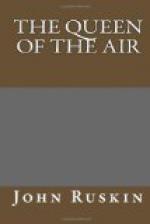153. “What!” a wayward youth might perhaps answer, incredulously, “no one ever gets wiser by doing wrong? Shall I not know the world best by trying the wrong of it, and repenting? Have I not, even as it is, learned much by many of my errors?” Indeed, the effort by which partially you recovered yourself was precious; that part of your thought by which you discerned the error was precious. What wisdom and strength you kept, and rightly used, are rewarded; and in the pain and the repentance, and in the acquaintance with the aspects of folly and sin, you have learned something; how much less than you would have learned in right paths can never be told, but that it is less is certain. Your liberty of choice has simply destroyed for you so much life and strength never regainable. It is true, you now know the habits of swine, and the taste of husks; do you think your father could not have taught you to know better habits and pleasanter tastes, if you had stayed in his house; and that the knowledge you have lost would not have been more, as well as sweeter, than that you have gained? But “it so forms my individuality to be free!” Your individuality was given you by God, and in your race, and if you have any to speak of, you will want no liberty. You will want a den to work in, and peace, and light—no more,—in absolute need; if more, in anywise, it will still not be liberty, but direction, instruction, reproof, and sympathy. But if you have no individuality, if there is no true character nor true desire in you, then you will indeed want to be free. You will begin early, and, as a boy, desire to be a man; and, as a man, think yourself as good as every other. You will choose freely to eat, freely to drink, freely to stagger and fall, freely, at last, to curse yourself and die. Death is the only real freedom possible to us; and that is consummate freedom, permission for every particle in the rotting body to leave its neighbor particle, and shift for itself. You call it “corruption” in the flesh; but before it comes to that, all liberty is an equal corruption in mind. You ask for freedom of thought; but if you have not sufficient grounds for thought, you have no business to think; and if you have sufficient grounds, you have no business to think wrong. Only one thought is possible to you if you are wise—your liberty is geometrically proportionate to your folly.
154. “But all this glory and activity of our age; what are they owing to, but to freedom of thought?” In a measure, they are owing—what good is in them—to the discovery of many lies, and the escape from the power of evil. Not to liberty, but to the deliverance from evil or cruel masters. Brave men have dared to examine lies which had long been taught, not because they were free-thinkers, but because they were such stern and close thinkers that the lie could no longer escape them. Of course the restriction of thought, or of its expression, by persecution, is merely a




